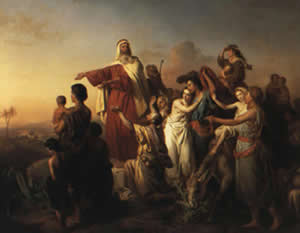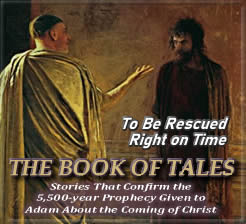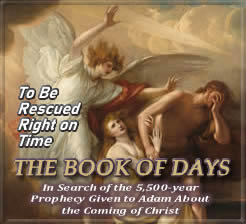Misconception #44 (Cont’d)
Moses Spent Forty Years as a Lonely Shepherd Before He Led Israel in the Exodus
According to The Book of Jasher, a war was raging between the people of Aram and Cush at the same time that Moses first left Egypt. From there, he went to the land of Cush, where the king and princes found that Moses was a great and worthy fighter among their troops. To them, he was like a lion in battle, and soon he became the king’s counselor.
After several years with them, the king of Cush died unexpectedly, and the people made Moses their new king, even going so far as to give him the wife of their dead king as a bride.1
For forty years, Moses reigned over the land of Cush, as the Lord had granted Him divine favor in the sight of all the people. But even as Moses sat upon the throne, he never forgot the God of his forefathers, so much so that he avoided conjugal relations with his new queen, recalling how Abraham had forbidden his sons to take wives from the daughters of Canaan. Moses even restrained from falling in love with the queen, preferring to follow the Lord with all his heart and mind.
So it was that during his forty years as king—an account that admittedly differs from that of Genesis and Acts—Moses accomplished many great things because the Lord was with him.2 He prospered in his kingdom, conducting the government of Cush in justice and integrity, and so the people both loved him for his deeds and feared him for his prowess.
Story Continues Below
Says Richard Price—the founder and CEO of Academia.edu—on his podcast In Depth With Academia:
Fish Tales (From the Belly of the Whale): Fifty of the Greatest Misconceptions Ever Blamed on The Bible is:
To hear Price’s book review of Fish Tales (From the Belly of the Whale), CLICK HERE.
To hear Kent and Zen Garcia talk about correcting biblical misconceptions, from June 23rd, 2021, CLICK BELOW.
Story Continues From Above
Meanwhile, however, the queen grew jealous of Moses’ power, resentful over his blatant disregard for her. In the fortieth year of Moses’ reign, she instigated a rebellion against her husband, citing his disloyalty to the gods of Cush. “It’s far better,” she said, “for my son to reign over you than this slave of the king of Egypt.”
But the people of Cush were afraid to revolt against their beloved king, so they couldn’t bring themselves to disparage him or harm him in any way. Instead, they lavished him with great honor and splendid gifts, and sent him on his way.
So Moses left the land of Cush, because—says Jasher—it was according to the Lord’s plan, as it was now the appointed time for which God had destined him to lead the Israelites from the affliction of Egypt.3
When we take the time to look, then, we see that God knew exactly what He was doing when He called Moses into action as the deliverer of Israel.
At this point, however, we’re faced with a mystery. If Moses did write The Pentateuch—as I believe he did—what could’ve compelled him to leave out this chapter of his life? Was he doing what any other storyteller would’ve done faced with a similar situation? Meaning: Was he trying to emphasize God’s role in rescuing the Children of Israel while trying to de-emphasize his own?
Well, if he was, he certainly didn’t have to. The Bible is full of instances where God chose individuals whom He trained to do certain jobs before He called them to greater tasks later in their lives. Before his confrontation with Goliath, David killed a lion—not to mention his time as a mere shepherd en route to becoming ruler over all Israel. Then there were many of Jesus’ disciples who apprenticed as fishermen before the Lord called them to become fishers of men.
Again and again, we find this happening. The Book of Hebrews in particular speaks of this, when it uses a word that in the Greek is a derivative of the English words to “train” or “nurture.” It’s used no less than six times in seven verses in the twelfth chapter of Hebrews. The Greek word used there is paidea, meaning “to chasten,” which denotes the way a schoolmaster trains or nurtures a child.
In our modern view, the word “chasten” brings to mind everything negative and abrasive. But in the context of God’s plan, it connotes His divinely-inspired ways of training us, trial by trial, all the while nurturing us toward a deeper awareness of His control over our lives…
That’s clearly what God did with Moses.
Far from calling him to a task that was beyond his ability, the Lord had trained him in that forty-year wilderness experience to know exactly what it was like to lead a great mass of people through the challenges that faced them in that day and age. So when Moses bantered with God over his mission to lead the Israelites in the Exodus, he was nothing like the raw greenhorn that tradition has led us to believe. In fact, he was acting like any war-weary veteran in that situation. He knew he was qualified for his next mission; he just needed a push in the right direction. And as for God, He knew exactly why He’d chosen Moses, because he was someone He’d been training, hand in hand, for four decades in the wilderness of Cush.








